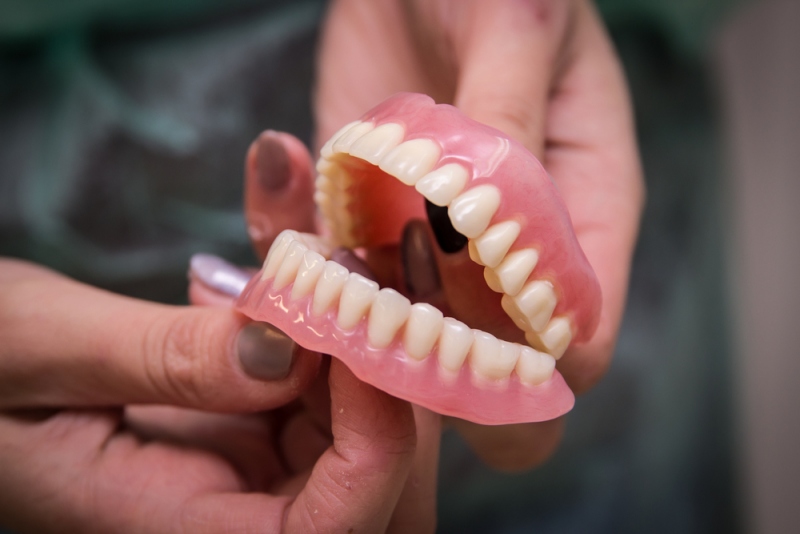If you were told that you’re a good candidate for dentures, you may feel overwhelmed, curious, confused, or all of the above. You may want to know what happens next. With that in mind, here’s what to expect when receiving and wearing dentures.
What are dentures?
Think of dentures as replacements for missing teeth, except they can be removed from your mouth. There are two types of dentures: full and partial. Partial dentures are smaller and meant to be a substitute for only a few teeth in certain areas of your mouth. Full dentures replace the entire row of teeth — either your top row, bottom row, or both.
Dentures are fully customizable to you by your dentist. They are fitted and created via an impression, and are meant to feel like normal teeth when you bite down, chew, smile, and talk. Typically, your dentures will be given to you once all the teeth in that specific space — either the row, or a small cluster of teeth such as the back molars — are surgically removed if necessary and the remaining tissue is cleaned.
Why should you consider dentures?
There are three main reasons why you should consider dentures. If you are missing full teeth, if you suffer from severe cavities, or if you suffer from gingivitis (a form of periodontal disease), then dentures are often a viable alternative.
If you suffer from one or all three of these problems, consider choosing dentures. They’re a great way to improve the look and feel of your smile without having costly dental implants
Fitting dentures
To ensure that you have the best fitting dentures possible, you have to go through a fitting process. This usually entails:
- Removing all remaining teeth.
- Taking an impression of your gums, and any teeth you have in your mouth. For example, taking a mold of the top row if you are getting partial dentures for the lower row.
- Using bite molds to check that your bite is comfortable.
- Looking at wax models to pick the size, shape, and color of your new dentures.
- Making final fittings. Once the denture is made, your dentist will have to make tiny adjustments to fit them adequately in your mouth.
Adapting to dentures
Getting used to dentures can be challenging, but the following strategies can help you adjust faster:
- Have realistic expectations. You won’t be able to chew, speak, and smile like you used to at first. Think of it this way: you have lived your entire life with your teeth and now you have an entirely new set. That takes some getting used to.
- Exercise your cheek muscles. Your cheek muscles are incredibly important to strengthening your mouth and allowing food to go down your throat, so doing daily stretches and exercises will help these muscle groups adapt to the new dentures.
- Sing your words instead of talking. It might feel embarrassing, but the technique of singing drawn out words will help your mouth readjust to forming certain words.
- Try out different adhesives. Not all are created equally, and it will take some trial and error to figure out what works best for you.
Denture care tips
As a way to prolong the life of your dentures, follow these tips:
- Always remove and rinse out your dentures every time you eat.
- Clean out your mouth every time you remove your dentures.
- Brush your dentures on a daily basis.
- Keep your dentures moist by soaking them in specialized solution every night.
- Don’t forget your dental checkup! Just because you have dentures doesn’t mean you can forget all about regular dental care. Ask your dentist, like the ones who provide dental care in Scotch Plains, NJ for a recommendation for how long you should go between appointments.
With this guide in mind, you are on your way to having a great relationship with your dentures.




























No Comments
Leave a comment Cancel